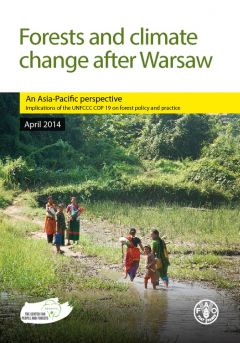Focal point
Location
The Food and Agriculture Organization of the United Nations leads international efforts to defeat hunger. Serving both developed and developing countries, FAO acts as a neutral forum where all nations meet as equals to negotiate agreements and debate policy. FAO is also a source of knowledge and information. We help developing countries and countries in transition modernize and improve agriculture, forestry and fisheries practices and ensure good nutrition for all. Since our founding in 1945, we have focused special attention on developing rural areas, home to 70 percent of the world's poor and hungry people.
Members:
Resources
Displaying 2096 - 2100 of 5074The State of the World's Forest Genetic Resources and the Global Plan of Action for the conservation, sustainable use and development of Forest Genetic Resources
Meeting Name: Committee on Forestry
Meeting symbol/code: COFO/2014/5.5
Community level legal education and support to help rural women secure and exercise land and resource rights, and address HIV-AIDS related tenure insecurity – GCP /MOZ/086/NOR
The project “Community level legal education and support to help rural women secure and exercise land and resource rights, and address HIV-AIDS related tenure insecurity - GCP/MOZ/086/NOR”, hereinafter abbreviated as GCP/086, is the most recent of a series of FAO initiatives implemented, to a large extent, in partnership with the Juridical and Judicial Training Centre (CFJJ) of the Ministry of Justice of the Republic of Mozambique as well as in partnership with a number of National NGOs. GCP/086 started in March 2010.
НАБОР ИНСТРУМЕНТОВ ДЛЯ УСТОЙЧИВОГО УПРАВЛЕНИЯ ЛЕСАМИ
Meeting Name: Committee on Forestry
Meeting symbol/code: COFO/2014/6.2
Land and Water Rights Hotspot
Includes growing pressures on land and water rights, growing conflict; different pressures on land and water; availability of agricultural land and water throughout the world; distribution of access rights; socio-economic, legal and political variables; conflict over land tenure and water rights; demographic and climate factors; land grabbing a burning question; are we headed for global crisis?
Forests and Climate Change After Warsaw: An Asia-Pacific Perspective
The 19th Conference of Parties (COP) of the United Nations Framework Convention on Climate Change (UNFCCC) was held in Warsaw, Poland, 11–22 November 2013. The outcomes of COP 19 are expected to have a significant impact on developments in the field of forests and climate change over the coming year. In view of this, forest sector stakeholders in the Asia-Pacific region require succinct and accurate information on the implications of COP 19 discussions and their significance to forest policy decisions and practice.








